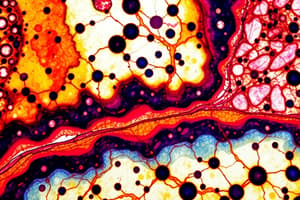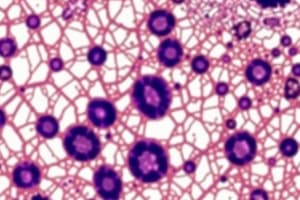Podcast
Questions and Answers
What is a characteristic of formalin-fixed tissue?
What is a characteristic of formalin-fixed tissue?
- It is mainly used for electron microscopy.
- It cannot be stored indefinitely.
- It has less shrinkage in tissues. (correct)
- It hardens tissue poorly.
What is a limitation of glutaraldehyde fixation?
What is a limitation of glutaraldehyde fixation?
- It is not suitable for immunohistochem specimens.
- It is slow in tissue penetration.
- It is too expensive.
- It can overharden tissue. (correct)
What is formalin commonly used for?
What is formalin commonly used for?
- Gross examination of specimens.
- Immunohistochem and molecular tests. (correct)
- Electron microscopy.
- Cytoplasmic staining.
Why is formalin a popular fixative?
Why is formalin a popular fixative?
What is a difference between formalin and glutaraldehyde?
What is a difference between formalin and glutaraldehyde?
What is the main objective of tissue preparation for staining?
What is the main objective of tissue preparation for staining?
What type of dyes are crystal violet and safranin?
What type of dyes are crystal violet and safranin?
What determines the color of cytoplasmic staining?
What determines the color of cytoplasmic staining?
What is the purpose of Harris Hematoxylin in H & E staining?
What is the purpose of Harris Hematoxylin in H & E staining?
What is the mechanism of nuclear staining?
What is the mechanism of nuclear staining?
What is the difference between progressive and regressive staining?
What is the difference between progressive and regressive staining?
What is the function of ammonium aluminum sulfate in the Harris Hematoxylin staining procedure?
What is the function of ammonium aluminum sulfate in the Harris Hematoxylin staining procedure?
What is the pH range at which Eosin Y stains best?
What is the pH range at which Eosin Y stains best?
What is the component of the H & E staining procedure that is used to oxidize the hematoxylin?
What is the component of the H & E staining procedure that is used to oxidize the hematoxylin?
What is the purpose of using xylene in the H & E staining procedure?
What is the purpose of using xylene in the H & E staining procedure?
What is the function of glacial acetic acid in the Eosin Y staining procedure?
What is the function of glacial acetic acid in the Eosin Y staining procedure?
What is the purpose of using absolute ethanol in the H & E staining procedure?
What is the purpose of using absolute ethanol in the H & E staining procedure?
Flashcards are hidden until you start studying
Study Notes
Fixatives
- Formalin is a fixative of choice for IHC and molecular tests, especially the 10% NBF.
- It prevents alterations during processing and preserves tissue morphology.
- It is cheap and stable.
- Tissue can be stored indefinitely, except for immunohistochem specimens.
Glutaraldehyde
- Similar to formalin but much slower in tissue penetration.
- Used mainly for electron microscopy.
- Can overharden tissue, and fixation is best limited to 2 hrs.
Specimen Preparation
- Criteria for rejecting specimens must be identified.
- Different materials are used for gross examination of specimens.
- Failure to form ribbons during sectioning is due to a dull knife or paraffin that is too hard.
- Holes in the sections are due to improper block positioning or excessive dehydration.
Staining of Tissues
- Staining begins with the complete removal of paraffin for water-soluble stain solutions to act on the tissues.
- Nuclear staining involves the use of basic (cationic or positively charged) dyes, forming dye-salt unions, and is "basophilic".
- Cytoplasmic staining depends on the pH of the solution (acidic-pinkish, basophilic-purplish/bluish).
- Progressive staining is a method where the reaction proceeds "forward" and is stopped once the desired intensity of color is achieved.
- Regressive staining involves overstaining the tissue and then decolorizing until the desired element remains stained.
Harris Hematoxylin
- A commonly used nuclear stain in routine H & E stains.
- Ready-to-use preparations are available.
- Now uses sodium iodate instead of mercuric oxide.
Eosin Counterstain
- Most widely used cytoplasmic stain in routine staining.
- Is the sodium salt of a color acid that stains best at pH 4.6-5.
H & E Manual Progressive Staining Procedure
- Involves a series of steps using xylene, absolute alcohol, Harris Hematoxylin, ammonia, and Eosin.
Automated Staining
- Uses linear strippers to transfer slides from one container to the next, leaving the slide in each container for the same amount of time.
Mounting and Labeling of Slides
- Different types of mounting media are used in histotechnology.
- Different types of cover slips are used.
- Steps in cover slipping include applying mounting media, applying a coverslip, and sealing the edges.
- A slide label includes the patient's name, specimen number, and diagnosis.
Studying That Suits You
Use AI to generate personalized quizzes and flashcards to suit your learning preferences.




